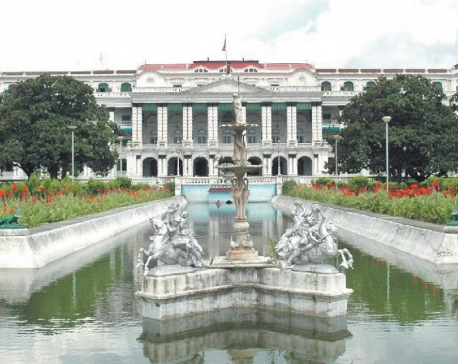
OR
Editorial
Salvaging economy from impending crisis
Published On: March 17, 2023 07:51 AM NPT By: Republica | @RepublicaNepal

The government has recently announced measures to tackle the widening budget deficit caused by low revenue collection. The budget deficit as of eight months of the current fiscal year 2022/23 has surpassed Rs 156.44 billion, with the government having spent Rs 779.23 billion of its budget as of mid-March this year, while the revenue collection stood at Rs 622.78 billion. To address this issue, the government has taken the decision to restrict foreign visits by ministers and high-ranking government officials unless it is absolutely necessary. Additionally, the government is considering reducing staff in government offices across the country. While these measures may seem extreme, they are necessary to address the budget deficit and ensure that the government can continue to operate efficiently. The government's decision to restrict foreign visits is a sensible one, as it will reduce unnecessary expenses and allow the government to focus on managing its finances. By cutting down on overstaffing in government offices, the government can further reduce costs and operate more efficiently.
However, the government must be careful not to make these measures too extreme. Cutting down on staffing levels too quickly could have a negative impact on the efficiency of government services. The government should ensure that it is making informed decisions about staffing levels and that it is not cutting necessary positions. The decision to cut the grant amount being provided to farmers for the purchase of chemical fertilizers is another example of the government's efforts to reduce unnecessary expenditure. While this decision may be unpopular with farmers, it is necessary to ensure that the government can continue to provide essential services to its citizens. The decision to remove the grant amount to farmers may cause a steep rise in the costs of various agricultural products, causing ordinary people to suffer a lot. The government's decision to announce austerity measures earlier last month was also a step in the right direction. By cutting down on unnecessary public expenditure and maintaining fiscal discipline, the government can ensure that it is making the most of its limited resources. The government's decision to slash 20 percent of the budget approved for various headings such as fuel, maintenance, stationery and office materials, newspapers, printing and publication of information, service and consultancy incurred by all the ministries and agencies of the federal government is a sensible one.
The budget approved for information system and software operation, travel and other allowances, program cost, monitoring and evaluation cost, staff training, workshop and seminar, sundry expenses, machinery and equipment, furniture and fixtures and structural improvement of the buildings will also be reduced by 20 percent, according to the Ministry of Finance. These measures will help to ensure that the government is able to operate more efficiently and effectively. As the government is in the process of expanding the cabinet, the looming economic crisis highlights the need to appoint a new finance minister who has knowledge and expertise to salvage the country's economy from the looming crisis. This may even require a person from outside of politics. All parties, especially those in the ruling alliance, must be prepared for this scenario as well, keeping in view of the larger interest of the country and its economy.
In light of the suggestion from a section of economists that most countries in the world could experience a severe economic crisis in the year 2023, the government's decision to take measures to address the widening budget deficit is a sensible one. While some of these measures may be unpopular with the citizens, they are necessary to ensure that the government can continue to provide essential services and manage its finances effectively. The government must be careful to make informed decisions about staffing levels and to ensure that it is not making cuts that will negatively impact the efficiency of government services. With careful planning and implementation, the Nepalese government can successfully address its budget deficit and ensure a more stable financial future for the country.
You May Like This

Govt under pressure to manage expenses necessary for day-to-day operations
KATHMANDU, Oct 17: The government is under pressure to manage necessary amounts to meet the day-to-day liabilities under the headings... Read More...

Govt takes debt of Rs 49.23 billion in first two months of current FY
KATHMANDU, Sept 29: The government took an additional debt of Rs 49.23 billion in the first two months of the... Read More...




Just In
- Govt receives 1,658 proposals for startup loans; Minimum of 50 points required for eligibility
- Unified Socialist leader Sodari appointed Sudurpaschim CM
- One Nepali dies in UAE flood
- Madhesh Province CM Yadav expands cabinet
- 12-hour OPD service at Damauli Hospital from Thursday
- Lawmaker Dr Sharma provides Rs 2 million to children's hospital
- BFIs' lending to private sector increases by only 4.3 percent to Rs 5.087 trillion in first eight months of current FY
- NEPSE nosedives 19.56 points; daily turnover falls to Rs 2.09 billion















Leave A Comment